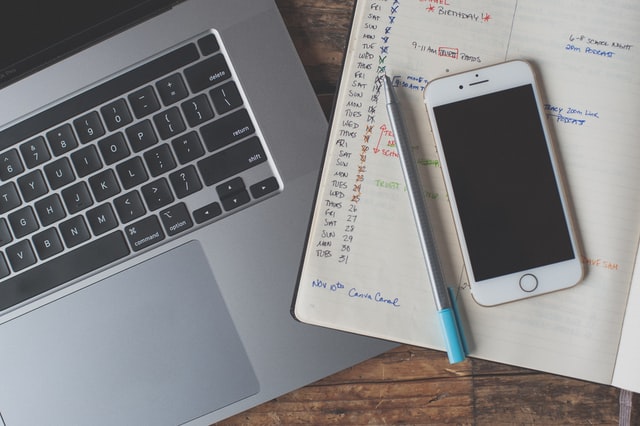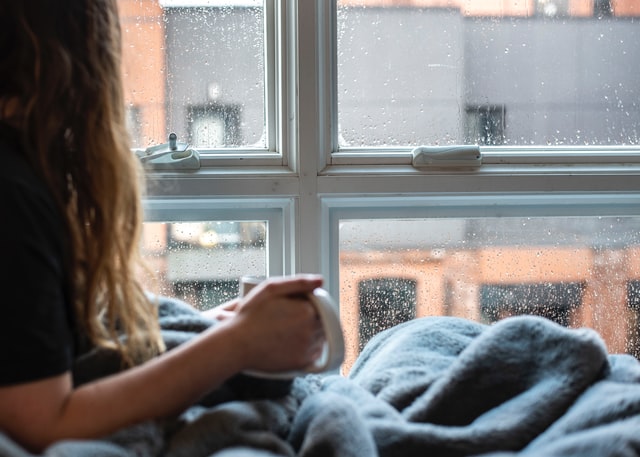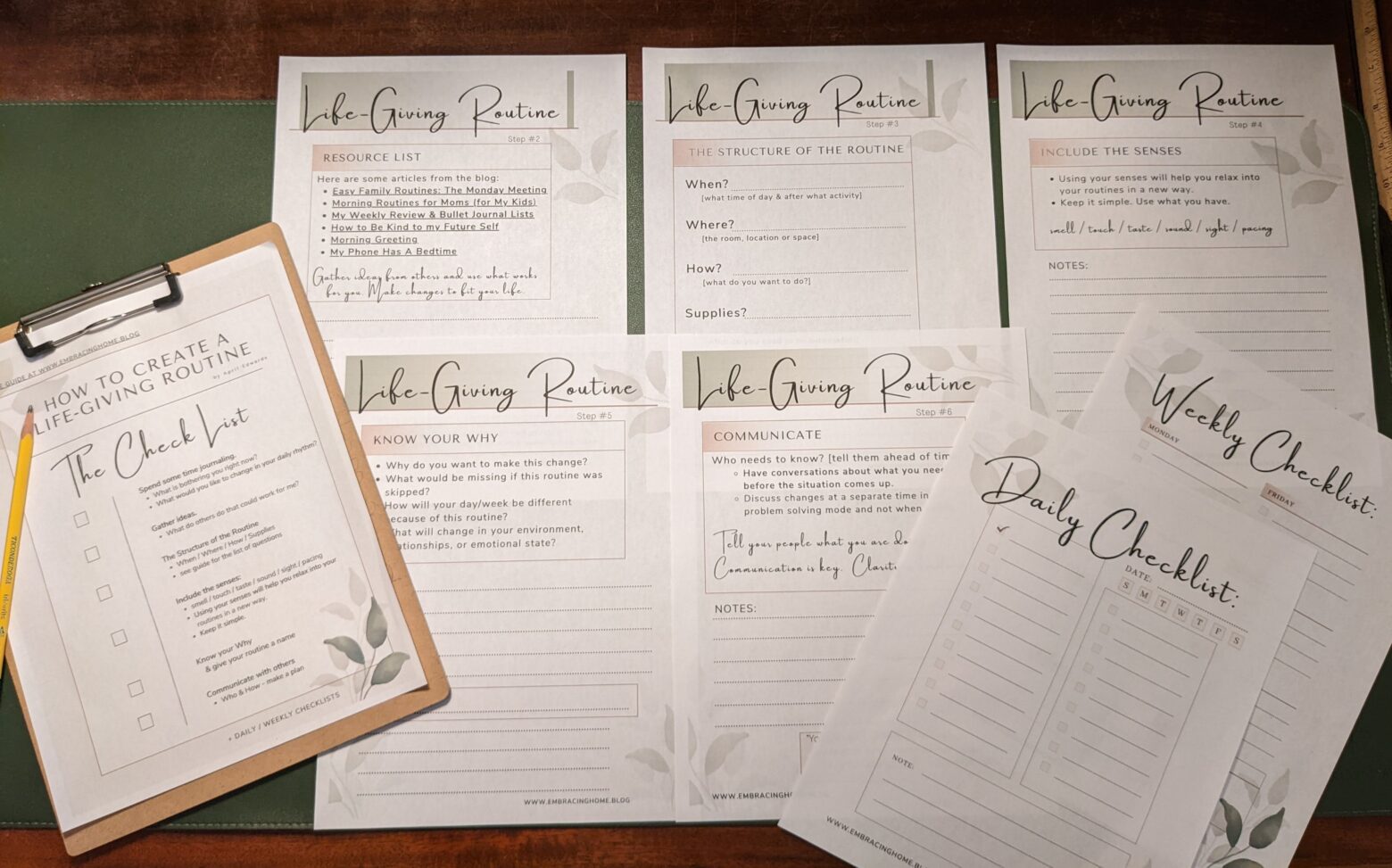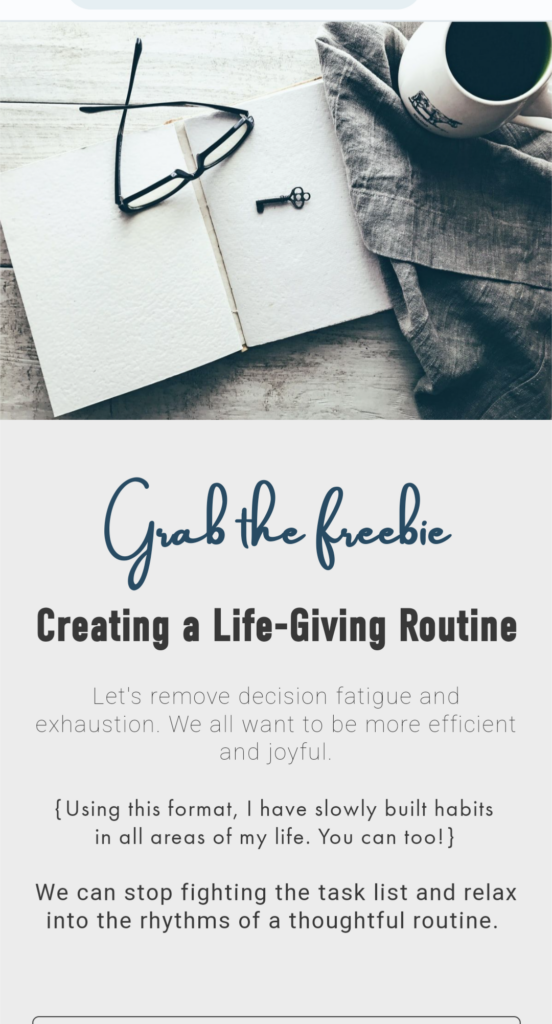We all have areas in our lives where we want to get things done quickly or “get in the zone” faster. Routines are the effortless solution.
When we automate pieces of our lives with routines we: remove decision fatigue, we become more efficient, and we can relax into the rhythm of the tasks ahead of us.
I have routines for all areas of my life with repetitive tasks: reading, homemaking, writing, mom life, exercise, meal prep, cleaning, Sabbath, and more.
I enjoy sitting down with a cup of coffee and doing all the thinking at once. I plan out what tasks need to be completed and then write them out for myself.
All I have to do for that routine the next day is follow the steps.
No thinking is required in the midst of a busy day!
Here is my process:
The Printable Walk – Through
How to Create
Life-Giving Routines
Here are some areas in my life where I use routines that I have planned out for a specific purpose:
- Reading books on the couch with the kids
- laundry -loading & folding
- homeschool prep and planning
- the weekly schedule
- getting out seasonal decor
- my weekly grocery shopping trip
- cleaning out the fridge on Mondays
- getting into my writing routine
- Saturday household chores
- making my seasonal photo album
- shopping at Costco
- my morning routine
- my weekly review / bullet journal time
- going for a walk
- nightly tuck in with the kids
- my evening routine after the kids are in bed
- putting my phone to bed

The Structure of the Routine:
- What? [name the routine you are creating]
- What is this routine about? What will you call it?
- Often I leave this blank until I know the rest of the information.
- It needs to be something simple and catchy for me to remember it. Don’t overthink it.🙂
- When? [what time of day & after what activity]
- When will this routine happen?
- Is there a specific time you need this routine to take place or just a general time of day?
- Where? [the room/location/space]
- This is important. Often location can be even more crucial than time.
- What room will you be in? Where will you sit or where will you go? What will be in that location?
- How? [what do you want to do?]
- What do you hope to accomplish and how will you get to that goal?
- What does “done” look like for this routine? How will you know that you have finished well?
- Supplies? [what do you need to be successful?]
- What is already in that location that will help you with that routine? Furniture, supplies, lighting, appliances.
- Do you need to clear clutter? Do you need to simplify that location so you can focus on what you need to do?
- What do you need for your routine? Go shop your house! What do you have that you can use?
- What is one special piece that you can add to make that routine enjoyable? Go shopping for that one small thing. A small bag of chocolate chips, a new lamp, a fresh Chapstick, or a new candle.

Include the senses:
smell / touch / taste / sound / sight / pacing
“Environment is the invisible hand that shapes human behavior.”
Atomic Habits by James Clear
When we include the senses we experience things on a deeper level. We can relax or “get in the zone” faster. Our amazing brains are constantly checking for environmental input that changes how we react.
I recommend using your senses to embrace your routines in a new way.

Communicate with others –
- Who needs to know? [tell them ahead of time]
- Have conversations about what you need before the situation comes up.
- Discuss your new morning routine the night before, share your new grocery shopping plan over the weekend, explain how you want to leave the house when everyone is relaxed.
- Discuss difficult things at a separate time when you are in problem solving mode and not upset.
- How to communicate: [text, note, conversation]
- Decide how to tell your people what you are doing.
- Communication is key.
- Clarity is kindness.
Some Examples of including the senses: a lit candle for writing time, a soft couch blanket for reading, a specific playlist for my workout, a hot cup of tea for evening downtime, open windows, specific lighting…
Don’t make it too complicated.
I do not need piles of stuff to accomplish my routines well. I just need a few triggers for my senses to get in the mode of what I am doing.

Why?
[Why is this important to you?]
- Why do you want to take the time for this?
- What would be missing if this routine was skipped?
- How will your day/week be different because of this routine?
- What will change in your environment, relationships, or emotional state?
When we automate pieces of our lives with routines we: remove decision fatigue, we become more efficient, and we can relax into the rhythm of the tasks ahead of us.
I have routines for all areas of my life with repetitive tasks. It saves me so much thinking and frustration.
You got this! Happy Planning – April
DID YOU MISS THE PDF?
the simple printable guide
…Still Feeling Stuck?
Here are some more Resources –
Below are some articles I have written on routines. It is a topic I enjoy learning and writing about.
- Mom Life:
- Homemaking:
- Writing:
- Sabbath Living:
Photos by Kelly Sikkema and others on Unsplash




